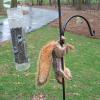Calcium Chloride dissolves very readily, in my experience. Perhaps you are seeing newly formed Calcium Carbonate coming out of solution when you add the Calcium Chloride. That is normal if you have high Carbonate water.
I tend to add it right on top of the mash...
Ultimately if you are at your desired pH it doesn't matter.
This is what it comes down to. If you hit your pH, it doesn't matter when you added anything. Any alkalinity lost by heating is accounted for in the actual pH of the mash, so adjusting the pH with acid in the mash is fine.
















